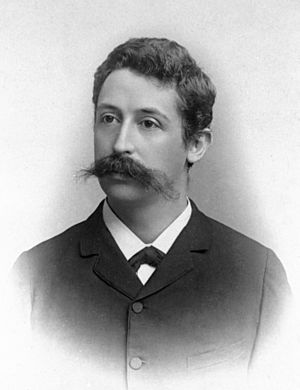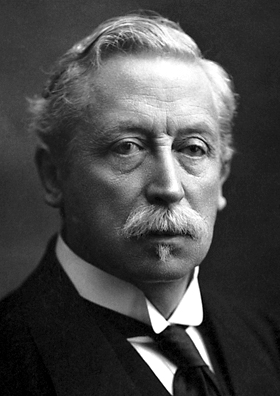Christiaan Eijkman facts for kids
Quick facts for kids
Christiaan Eijkman
|
|
|---|---|

Christiaan Eijkman
|
|
| Born | 11 August 1858 Nijkerk, Netherlands
|
| Died | 5 November 1930 (aged 72) Utrecht, Netherlands
|
| Nationality | Dutch |
| Known for | Beriberi, vitamins |
| Awards | Nobel Prize for Physiology or Medicine (1929) |
| Scientific career | |
| Fields | Physiology |
Christiaan Eijkman (born August 11, 1858 – died November 5, 1930) was a Dutch doctor and professor. He made a huge discovery about a disease called beriberi. He showed that beriberi was caused by not eating the right foods. This led to the discovery of vitamins, especially thiamine (vitamin B1).
In 1929, Christiaan Eijkman won the Nobel Prize for Physiology or Medicine. He shared this important award with Sir Frederick Hopkins for their work on vitamins.
Contents
Discovering Christiaan Eijkman's Life
Early Life and Schooling
Christiaan Eijkman was born in Nijkerk, Netherlands, on August 11, 1858. He was the seventh child in his family. His father was a school headmaster. His older brother, Johann Frederik Eijkman, also became a chemist.
When Christiaan was one year old, his family moved to Zaandam. There, his father became the head of a new school. Christiaan and his brothers went to school there. In 1875, Christiaan started studying at the Military Medical School. This school was part of the University of Amsterdam. He trained to be a medical officer for the Netherlands Indies Army. He did very well in all his exams.
From 1879 to 1881, he worked as an assistant to a professor named T. Place. During this time, he wrote his special paper called On Polarization of the Nerves. This paper helped him earn his doctoral degree with honors on July 13, 1883.
His Career and Big Discoveries
In 1883, Eijkman traveled from the Netherlands to the Dutch East Indies. This area is now known as Indonesia. He worked as a medical officer in different places like Semarang and Tjilatjap. In Tjilatjap, he got sick with malaria. This illness made him so unwell that he had to go back to Europe in 1885.
Going back to Europe turned out to be a good thing for Eijkman. He got to work in famous laboratories. He worked in E. Forster's lab in Amsterdam and Robert Koch's lab in Berlin. In Berlin, he met C. A. Pekelharing and C. Winkler. They were going to the Indies to study Beriberi. Eijkman joined their team as an assistant. Beriberi was a serious disease causing many problems in the region.
In 1887, Pekelharing and Winkler returned home. But Pekelharing suggested that the temporary lab in Batavia should become a permanent one. This idea was accepted, and Christiaan Eijkman became its first director. This meant he could focus completely on science.
Eijkman was the Director of the "Geneeskundig Laboratorium" (Medical Laboratory) from 1888 to 1896. During this time, he did some of his most important research. He studied the bodies of people living in tropical areas. He proved that many old ideas about health in the tropics were wrong. For example, he showed that the blood of Europeans in the tropics did not change unless they were sick. He also found that how much energy people used depended on their work, just like in cooler places. Eijkman's work helped people understand that Europeans could live in the tropics without special precautions.
His Most Important Work: Beriberi
Eijkman was sent to the Dutch East Indies to study beriberi. This disease affects the nerves in the body. But his biggest discovery about its cause happened by accident. He noticed that some chickens in his lab started showing symptoms of beriberi. This happened after their food was changed for a few months.
The chickens had been eating leftover rice from the military. Then, a new cook refused to let military rice be given to animals. So, new rice was bought from another place. Soon, the chickens got better. When the chickens were sick, they had been eating polished rice. When their diet changed back to unpolished rice, they recovered in just a few days.
Eijkman realized that polished rice was missing something important that was in unpolished rice. He thought that beriberi was caused by not having this missing part in the diet. He called it "the anti-beriberi factor." Later, he proved that the disease was not caused by dirty blood or other things. He first thought it might be a new type of germ.
Eijkman could not continue his research because he was still unwell. But his friend Adolphe Vorderman continued the study. Vorderman confirmed the link between polished rice and the disease. Eventually, scientists found that the missing compound was vitamin B1, also known as thiamine. A chemist named Casimir Funk later created the word "vitamin" from "vital amine."
For his work on discovering these anti-neuritic vitamins, Eijkman won the 1929 Nobel Prize for Medicine. He shared the prize with Sir Frederick Hopkins.
Besides his work on beriberi, Eijkman also studied other things, like how some foods ferment. He even wrote two textbooks for his students at the Java Medical School. One was about how the body works (physiology), and the other was about chemistry.
Later Life and Passing
In 1898, Eijkman became a professor at Utrecht University. He taught about hygiene and forensic medicine. His first speech there was about health and diseases in tropical areas. At Utrecht, Eijkman started studying bacteriology. He created a famous test to see if water was polluted by human or animal waste. This test looked for certain bacteria called coli bacilli.
He also studied how fast bacteria die from different things. He found that this process didn't follow a simple pattern. He also looked at why bacteria sometimes stop growing on solid surfaces.
Eijkman did not just work at the University. He also helped with public health issues. He worked on problems like water supply, housing, and school hygiene. He was part of the Health Council and Health Commission. He helped fight against alcoholism and tuberculosis. He even started a society to fight tuberculosis.
Christiaan Eijkman passed away in Utrecht on November 5, 1930, after being sick for a long time.
Awards and What He Left Behind
In 1907, Eijkman became a member of the Royal Netherlands Academy of Arts and Sciences. The Dutch Government gave him several special awards. When he had been a professor for 25 years, a fund was started to give out the Eijkman Medal. But the biggest honor was receiving the Nobel Prize in 1929.
Eijkman also received the John Scott Medal from Philadelphia. He was an honorary member of the National Academy of Sciences in Washington. He was also an honorary fellow of the Royal Sanitary Institute in London.
To honor his important work, the government of Indonesia named their research center for diseases and bacteria the Eijkman Institute for Molecular Biology.
His Family Life
In 1883, before he went to the Indies, Eijkman married Aaltje Wigeri van Edema. Sadly, she passed away in 1886. In 1888, Professor Eijkman married Bertha Julie Louise van der Kemp in Batavia. They had a son named Pieter Hendrik in 1890, who also became a doctor.
See also
 In Spanish: Christiaan Eijkman para niños
In Spanish: Christiaan Eijkman para niños
- Eijkman test
 | Janet Taylor Pickett |
 | Synthia Saint James |
 | Howardena Pindell |
 | Faith Ringgold |


